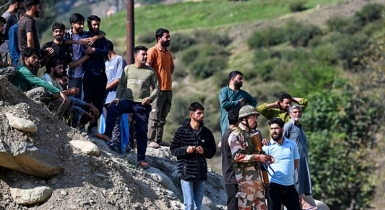
Environmental pollution has become alarming all over the world. Such is the extent that human civilization itself will be threatened if action is not taken now. In the name of development, environmental destruction continues all over the world. The first victim of development is the tree. But these trees also have life. They also suffer. There is a feeling of dying. Scientist Jagadish Chandra Bose proved this long ago. Even if we admit that we or this industrialized world is making a big mistake by cutting trees, we are busy cutting trees again without finding a way to escape from it. The result of which I am getting in hand. The earth's temperature is steadily increasing. Bangladesh has been scorched by record temperatures. Pakistan is burning. India is also burning. On the other side, hundreds of people are dying due to severe floods and landslides. The role of environmental pollution is behind this reverse behavior of nature. According to the report published in BBC News Bangla, scientists fear that this very hot world may exceed the maximum temperature increase for the first time in the next few years. They say there is a 66 percent chance that global temperatures will exceed 1.5 degrees Celsius by 2027. Bangladesh has alarming levels of pollution and environmental health risks. It disproportionately affects the poor, children under five, the elderly, and women. According to the World Bank report, more than 272,000 people died prematurely due to environmental pollution in Bangladesh in 2019. Of these, 55 percent of people died due to air pollution. Apart from this, due to pollution, there was an economic loss equivalent to 17.6 percent of the country's gross domestic product (GDP) that year. The World Bank's report titled 'The Bangladesh Country Environment Analysis (CEA)' released shows pictures of the damage caused by environmental pollution. According to the report, air pollution, unsafe water, poor sanitation and hygiene, and lead contamination are responsible for over 272,000 premature deaths annually. As a result, 522 crore days are spent in illness every year. Indoor and outdoor air pollution have the most detrimental effects on health. This loss is equal to 8.3 percent of the GDP of 2019.
The number of damages caused by climate change is increasing with time. The effects of climate change are now multifaceted. That is, our burden of damage due to climate change is gradually increasing. According to a research paper by Oxford University's School of Geography, 90 percent of the world's people are going to face intense heat and drought. According to the report published in the journal Nature Sustainability, natural disasters around the world will increase tenfold due to extreme warming and water scarcity on land. Carbon emissions will also be at their peak. Due to these reasons, the economy will also be affected. The rich will get richer, and the poor will get poorer. This situation will affect food production. According to the United Nations World Food Program, the number of hungry people in the drought-stricken Horn of Africa has reached 22 million. Kenya, Somalia, and Ethiopia are facing their worst drought in 40 years due to insufficient rainfall. These natural disasters are increasing with climate change around the world. According to the United Nations Office for Disaster Risk Reduction (UNDRR), the number of disasters worldwide could reach 560 annually by the year 2030. Which is close to two daily averages. According to the organization's report, in the last two decades, 350 to 500 moderate-to-severe disasters have affected the world's population every year. This is five times more than the average disaster in the previous three decades. Different countries in the world are suffering due to global warming. Among them, poor and middle-income countries are suffering the most. Bangladesh is the country most affected by the harmful effects of climate change. According to the Global Climate Risk Index published by the international research organization German Watch in 2010, Bangladesh ranks first among the top 10 affected countries in terms of damages due to climate change. Since the beginning of the industrial age, the average temperature of the Earth's atmosphere has increased by 1.1 degrees Celsius. There are two possible reasons for the destruction of this planet called Earth. Both of these reasons are man-made. One is war, and the other is a natural calamity. According to the World Bank report, environmental pollution is having a serious impact on children. Lead poisoning is causing irreversible damage to children's brain development. This results in an estimated IQ loss of about 20 million points per year. Household cooking with solid fuels is one of the main sources of air pollution and is affecting women and children more. The quality of water in Bangladesh's rivers has severely deteriorated due to industrial waste, unregulated plastic from various wastes, and untreated polluted water from other sources. Timely and urgent interventions to control air pollution, improve water, sanitation, and hygiene (WASH), and prevent lead pollution could prevent more than 133,000 premature deaths annually. Investments in green power generation, the use of green fuels in cooking, and stricter controls to prevent pollution from industries can reduce air pollution.
The 2015 global climate agreement in Paris, France, was a major step forward in addressing the potential risks of climate change. In this regard, developing countries like us were hopeful that we would find developed countries on our side to deal with the effects of climate change. Although the responsibility of our country in this climate change is relatively less, we are the ones who are suffering the consequences. Financial assistance to countries affected by climate change, like Bangladesh, in the Paris Climate Agreement, supported by 180 countries around the world. That money can work to counter the risk. Bangladesh is one of the countries with the most natural beauty among South Asian countries. Every year, natural disasters cause the loss of life and the deaths of innumerable people. As those people move towards the cities, the pressure is increasing on the city. Bangladesh is affected by various natural disasters, including cyclones, floods, monsoons, wildfires, and tornadoes. The pressure on the city is increasing. Begging is on the rise. We are at risk of sea level rise. If that happens, a part of our country is likely to sink. Not just our country. Such low-lying countries are likely to sink into the ocean. To escape from this situation, we have to save nature. And to save nature, a lot of trees should be planted. Fewer trees are being planted than the huge number of trees that are cut from our nature every day. People are realizing that there is no salvation for the human race without greening, but they are avoiding that responsibility for the sake of development. Which can bring about crises in the future.
Alok Acharja
Pabna,Bangladesh





































